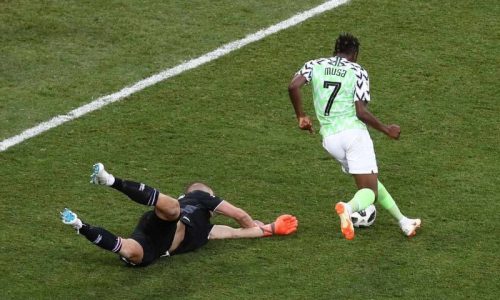The outgoing year in Sports will be remembered for many things, including the 2018 FIFA World Cup which did not disappoint as the flagship football competition in the world; with Nigerian forward Ahmed Musa among the headliners in Russia.
Nigeria’s Super Eagles were among thirty-two teams that participated at the Mundial and despite being the least ranked team in their group; which involved eventual finalists – Croatia, two-time champions Argentina and debutants Iceland, the Super Eagles inspired by the pacy Musa went within six minutes of qualification for the second round.
Prior to the World Cup finals, Musa was hardly a fancied name on the Super Eagles team sheet anymore. The ovation and respect brought by his two goals performance against Argentina at the 2014 World Cup in Brazil had diminished within twelve months of the heroics and the former CSKA Moskva star had gone from being named captain to being reduced to just another name on the substitute bench. That developmeant changed in Russia.
A late injury to winger Daddy Moses Simon before the World Cup meant that Musa would have some role to play from the bench for the Super Eagles but after playing for about half an hour in the opening loss to Croatia – replacing Alex Iwobi -, things changed for Musa as from the second game. The change became permanent – at least for the rest of the year – as he was justly named the Nigerian Footballer of the Year in November.
Read also: The night Musa rewrote history on a fertile ground
Change in tactics, change in fortune
Nigeria’s obliging loss to Croatia in Kaliningrad brought some deep soul-searching and returning to the basics of what the team did in most of their pre-tournament friendly games and the team’s technical crew – led by German Gernot Rohr – switched to a 3-5-2 set-up ahead of the game against Iceland in Volgograd. Their 4-2-3-1 formation had proved imbalanced and ambition-less in the loss to Croatia.
While the new formation basically afforded the team more defensive stability and allowing star winger Victor Moses to play the position in which he had thrived in the last two seasons in England, it was Musa who made the most of having a partner in his preferred central forward role with a domineering second half display to give Nigeria what turned out to be their only victory in the Eastern European country.
Musa’s decision to risk it all while attempting to bring down Victor Moses’ cross – which perhaps wasn’t meant for him – was symbolic of a last push by a woman in days of labour but whose hour of reckoning is at hand. The ball paid obeisance to each of his touch from that point and what followed was a two-goal performance accompanied by the Man of the Match award.
The determination, matched with execution of the first goal remained indelible in the minds of Nigerian football fans but what about the brilliance of the second? What looked like “just another long punt” by defender Kenneth Omeruo was turned to one of the tournament’s top goals by Musa whose pace and bravery down the left flank left the Icelandic defenders dragging their soccer pants as he rounded goalkeeper Hannes Þór Halldórsson – the former movie director made to scramble helplessly on the turf like an intruding artiste in a solo show.
Although Nigeria failed to keep up with the momentum of that victory in the end – losing to Argentina in St Petersburg to crash out of the tournament – Ahmed Musa never failed to sustain the momentum. Even after Nigeria’s elimination in Russia, Musa felt love like never before from Nigerians, both from the fans that thronged the Eagles’ Hotel Corinthia in the heart of St Petersburg on the night of the loss, and across all form of social media.
He was never going to let this moment slip. He did not. The first time the team regrouped after the World Cup was for an Africa Cup of Nations qualifier against Seychelles in September. Musa assumed the captainship of the team (since Mikel Obi had gone on sabbatical) and simply continued from where he stopped in Russia. His left footed volley from range ricocheting home off the Seychellois pastry-selling goalkeeper to set the tone for a routine 3-0 win for the Eagles.
In October, Nigeria faced Libya in a double-header fixture and Musa continued to make a mark in spite of Odion Ighalo’s overshadowing exploits. The former Kano Pillars star had the assist for Ighalo’s third goal in the 4-0 win in Uyo before contributing one goal and an assist to the Eagles’ 3-2 win in Sfax four days later, putting them within touching distance of a first AFCON qualification in five years.
Musa who joined Saudi club Al Nassr shortly after his World Cup exploits returned in November to seal the Eagles’ qualification in a 1-1 draw against South Africa and was very unlucky to have been denied a goal and an assist due to atrocious officiating.
The World Cup year turnaround was completed for Ahmed Musa by November when he was named the Nigerian Footballer of the Year at the Nigerian Sports Award – the second time he would win the gong.
He is still 26, so there still exists a possibility of another World Cup blitz for Musa should Nigeria qualify for the 2022 FIFA World Cup in Qatar but before then, the incumbent Eagles captain will hope to crown the 2018 goodness with the Africa Cup of Nations trophy in 2019.









